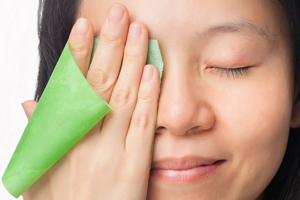TOPICALLY APPLIED L-CARNITINE EFFECTIVE IN TREATING OILY SKIN
Skin is the body’s largest organ and conditions affecting it, such as oily skin, can impact a person’s self-esteem. But Dr. Joshua Fox, founder and director of New York & New Jersey based Advanced Dermatology P.C., wants those dealing with an oily skin condition to know about promising new research which shows that when applied topically, L-Carnitine, an amino acid produced naturally in the body, is effective in treating oily skin. “The prospect of using a compound found naturally in the body is good news for those who require treatment for their oily skin condition,” reports Dr. Fox.
Causes of Oily Skin
The cause of oily skin is the substance sebum, which is produced in the sebaceous glands. For those with oily skin, the overproduction of sebum gives the skin an unwanted shiny, oily appearance. “Genetics and hormones play a role in whether or not a person has oily skin,” says Dr. Fox, “but diet has little or nothing to do with it.”
The Study
The study, conducted by Beiersdorf AG, Research and Development, Skin Research in Hamburg, Germany, aimed to identify an active substance to reduce sebum production by regulating fat metabolism in a natural way. The results were reported by the National Institute of Health’s MedLine Plus.
“L-Carnitine is an amino acid building block for proteins that helps the body produce energy, improve heart and brain function and assists with many other processes,” explains Dr. Meryl Joerg, Director of Advanced Dermatology PC Manhattan. “It has been used as a supplement for strict dieters and vegetarians and to improve muscle and vascular performance to name just a few of the already tried and successful applications. “
While the L-Carnitine research offers promising treatment for oily skin, Dr. Joerg suggests that following a skin care regime may prevent or minimize the need for treatment.
Cleanse skin with mild, non oily cleanser
- It is best to wash the face morning, evening and after heavy exercise. Often gels work better than creams since creams may have more of an oil base. All products used should be non-comedogenic. Use fingertips to apply.
Avoid over washing and harsh, abrasive cleaners
- Over washing, instead of eliminating oil on the skin, may work to produce more oil because it stimulates the oil production glands. Scrubbing the face with harsh cleansers also encourages more oil production. “If a basic cleanser doesn’t cut the oil. Dr. Fox suggests trying products that include an acid such as benzoyl peroxide saliclylic acid, glycolic acid or beta hydroxy acid. These products may be marketed for acne, but are fine for oily skin,” Dr. Fox advises.
Use mild, oil free moisturizer
- Keeping oily skin well moisturized decreases oil production.
Commit to Flexible Care
- Skin is affected by many elements, stress, hormones, even weather. It is necessary to tailor products to oily skin’s current condition. “Products used to curb oil production during the steamy summer months may be too harsh in the winter,” Dr. Fox cautions.
Mask and clay
- Apply only to problem areas, and even then, use occasionally.
Use medicated pads and/or cosmetic blotters during the day.
- Apply pad or blotter to oily areas such as the nose, forehead and chin. Avoid rubbing but hold pad or tissue to the skin for only as long as it takes to blot up the oil, 15-20 seconds.
- “The goal is not to trigger the oil glands to produce yet more oil. So steer clear of products with high alcohol content or products that make skin become dryer as they will trigger the oil glands to then produce more oil.”
Contact your dermatologist if oily skin persists
- Oily skin often leads to acne. There are numerous topical medications that can address this problem and decrease some of the oils. These include topical antibiotics, retinols, retinoids, benzoyl peroxide and many other prescription medications available by prescription by your dermatologist. Lasers and chemical peels reduce oiliness. “And now, topically applied L-Carnitine offers those who need it, a natural compound to treat oily skin,” concludes Dr. Fox.

